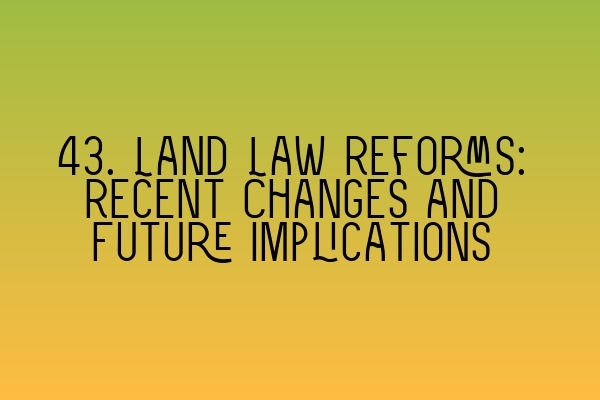43. Land Law Reforms: Recent Changes and Future Implications
Welcome to another informative blog post from SQE Property Law & Land Law! In today’s discussion, we will be exploring the topic of land law reforms, specifically focusing on the recent changes that have taken place and the future implications they may have. This is a crucial area of property law that affects various stakeholders, including homeowners, investors, and developers. So, without further ado, let’s dive right in!
Understanding Land Law Reforms
Land law reforms refer to the legislative changes and updates made to the legal framework governing land ownership, use, and transfer. These reforms aim to enhance legal clarity, promote efficiency, and ensure fairness in property transactions. The enactment of new laws and the amendment of existing ones play a vital role in shaping our understanding of property rights and obligations.
Recently, there have been significant changes in land law that require our attention. These reforms touch on various aspects of property ownership and management, including land registration, leases, property dealings, and more. Examining these changes will not only help us comprehend the current state of land law but also allow us to anticipate future trends and prepare ourselves accordingly.
Key Changes in Land Law
One major area of land law reform is land registration. In an effort to streamline the process and ensure accuracy, the introduction of electronic conveyancing has gained traction. This new system aims to digitize land registration, making it more efficient and accessible for all parties involved. With electronic conveyancing, property transactions can proceed smoothly, reducing paperwork and simplifying the conveyancing process. This change has significant implications for property lawyers, conveyancers, and even individuals buying or selling property.
Another recent change in land law pertains to leases. The Landlord and Tenant Act 1954 has undergone a series of amendments, resulting in a more balanced and modernized approach to tenancy agreements. These revisions aim to protect both landlords and tenants, ensuring a fair and mutually beneficial relationship. It is important for property owners and tenants alike to familiarize themselves with these changes to understand their rights and obligations under the updated legislation.
Property dealings have also seen reforms in recent years. The Law Commission’s report on the simplification of land transactions and land registration highlights the need for a more accessible and user-friendly conveyancing process. This report suggests various reforms, such as the creation of a comprehensive digital register and the introduction of standardized forms for property transactions. These proposals, if implemented, will revolutionize the way we deal with property and provide a more efficient and transparent process for all parties involved.
Future Implications
The recent changes in land law have far-reaching implications for various stakeholders. Homeowners will benefit from the streamlined processes and increased transparency, allowing them to have greater confidence in their property transactions. Investors and developers will also find a more efficient and accessible environment for property dealings, encouraging further investments in the real estate sector.
Property lawyers and conveyancers must stay up-to-date with these reforms to ensure they provide the best legal advice and assistance to their clients. As the legal landscape evolves, it is crucial for legal professionals to adapt and embrace these changes, integrating technology and digitization into their practices.
Finally, aspiring property lawyers must also take note of these reforms as they prepare for the upcoming SQE examinations. Familiarity with land law reforms and the ability to apply them to practical scenarios will be essential for success in the SQE exams. SQE 1 Practice Exam Questions and SQE 1 Practice Mocks FLK1 FLK2 are valuable resources to test your knowledge and readiness for the exams. Additionally, SQE 1 Preparation Courses and SQE 2 Preparation Courses offered by SQE Property Law & Land Law can provide comprehensive guidance and support in your exam preparation.
Conclusion
Land law reforms continue to shape the legal landscape of property ownership and transaction in the UK. Understanding these changes and their implications is vital for property stakeholders, legal professionals, and aspiring lawyers. As we move forward, it is essential to stay informed, adapt to new technologies and processes, and utilize the resources available to us to navigate this evolving area of law.
For more information on the SRA SQE Exam Dates and other related topics, please explore our website and stay tuned for future blog posts from SQE Property Law & Land Law!
